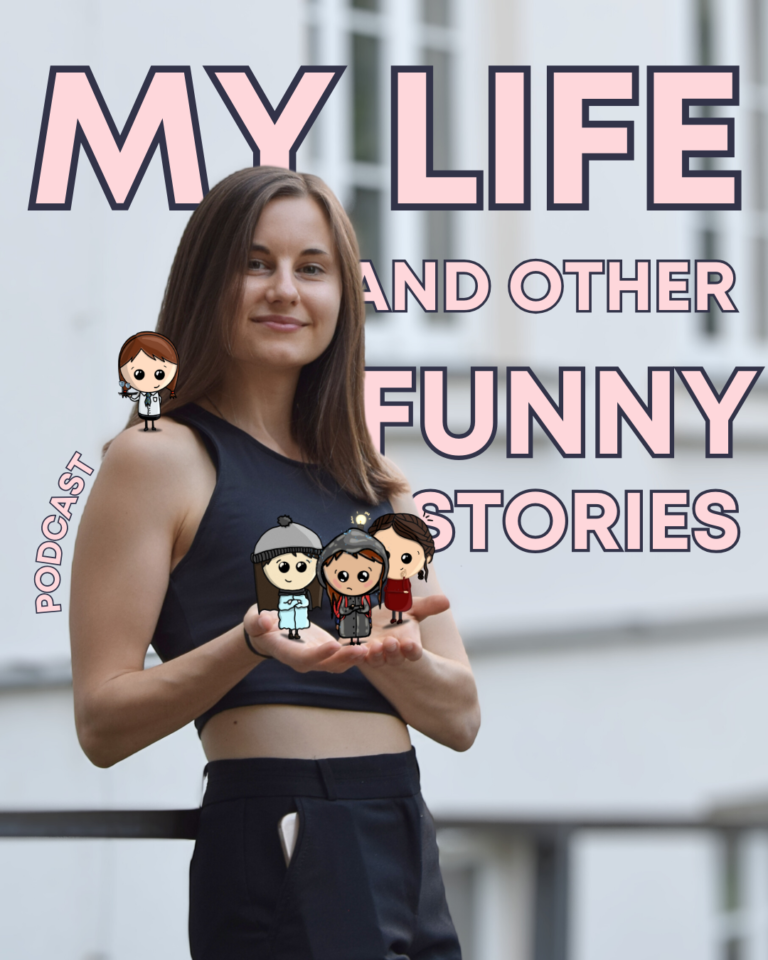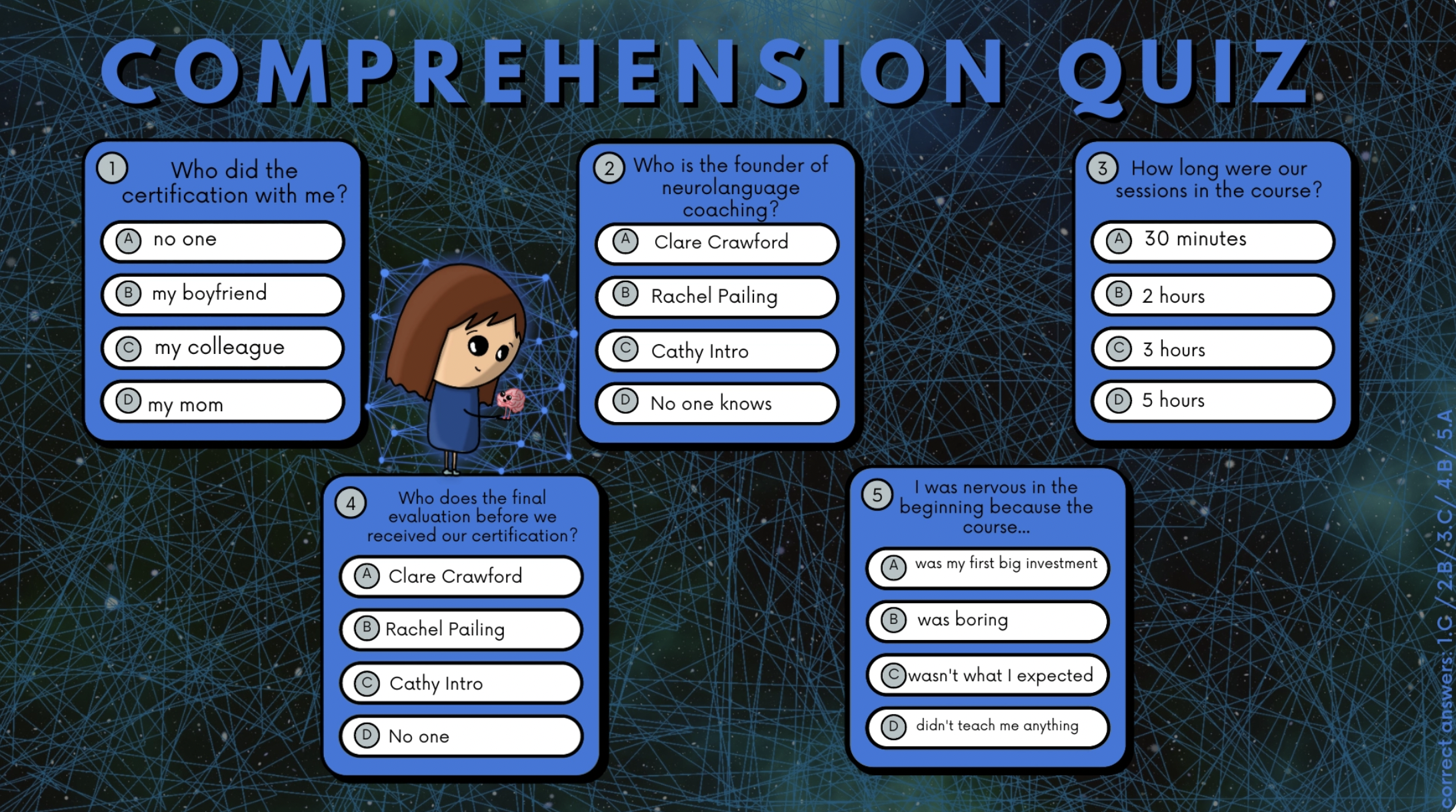
In this episode, I want to share with you something exciting! At least for me! I became a certified neurolanguage coach! You might be probably asking: What the hell is neurolanguage coaching and honestly, it is a good question which I am going to answer today. I want to talk about this method, about the course I took to become a neurolanguage coach and how it is different from the conventional style of teaching a language. So without further ado, let’s get into the episode.
Also, you can find the vocabulary and comprehension quiz under the transcription!
(Česky: Najdete seznam slovíček a krátký kvíz porozumění pod přepisem)
¨
🎧LISTEN TO THE EPISODE HERE:


Hello and welcome to my podcast My Life and Other Funny Stories. My name is Dagmar Tomášková, I am an English tutor and coach and I created this podcast for English students who want to get better in their oral comprehension. As always you can find the transcription of this episode, comprehension quiz, and vocabulary list in the notes of the podcast.
In this episode, I want to share with you something exciting! At least for me! I became a certified neurolanguage coach! You might be probably asking: What the hell is neurolanguage coaching and honestly, it is a good question which I am going to answer today. I want to talk about this method, about the course I took to become a neurolanguage coach and how it is different from the conventional style of teaching a language. So without further ado, let’s get into the episode.
So, what is Neurolanguage coaching®? It is an approach created by a neuroscientist, language coach and author Rachel Paling.
It is a collaboration between a coach and a coachee where the coach is helping the coachee (= the learner) achieve a specific goal through open conversation. This collaboration helps the coachee take full responsibility for their own success but the coach will help them every step of the way. As Rachel Pailing writes on her website: „Through neuroscience, we know that no two brains are the same, so neurolanguage coaching® is tailor-made learning to clients´ needs, without books, but with clear and structured targets to achieve in defined periods of time. . . . This method and approach create the perfect learning conditions for the brain leading to faster, more efficient, sustainable and cost-effective results“ [1]
The approach of language coaching is different from normal language teaching in many ways. First of all, the first session of the coaching is widely different from your casual English lesson as its primary goal is to find out as much as I can about you, the learner. With the help of specific techniques and well asked questions, I navigate you through your motivations, your ways of learning, the activities that YOU want to do and based on that we set your specific goals which will create a unique plan that will work specifically for you.
Because as I quoted a few minutes ago: No two brains are the same. Which means that what works for someone else might not work for you and vice versa. With me as the coach, you then have the accountability and responsibility to actually follow through this journey and not only learn to speak English but also learn how to learn. Which is a skill that will help you for the rest of your life.
Another difference from the conventional learning teaching is that it is very learner-centered. What does it mean? It takes you away from the passivity and gives you the opportunity to be an active learner. You will recognize that you are the one responsible for your own learning process which leads to feelings of freedom and empowerment. Teaching is built on the basis that it tells you what to do, gives you stricter instructions while coaching is a much more flexible, dynamic and adaptable process. It shows you that there are so many ways to learn English that even go beyond the singular sessions and from my time absolving the course, I became much more aware of the new possibilities and opportunities that I can offer you as a language coach.
If you want to know more about this method, I will, of course, leave a link to Rachel’s page in the notes of the podcast, so you can read and hear more about it yourself.
So, now that we have the introduction of neurolanguage coaching done, I want to talk a little bit about the time I took the course.
To be honest, as I have always been very interested in self-improvement as a language teacher, I was reading a lot of articles, listening to podcasts and overall trying to find as much information that could help my students as possible. For me, the topic of language learning is not just a matter of my work life. I am genuinely interested in it and I want to be the best language teacher, mentor, coach, or whatever you can call my job, possible. I want to see my students succeed and I want to give them the best possible service I can.
So it is a neverending process of self-development.
However, from time to time I came across the idea of neurolanguage coaching and as I was also interested in my French learning, I started listening to a podcast called „My Polyglot Life“ which is in French. It is hosted by Cathy Intro who is a certified neurolanguage coach and she often talked about this method and about Rachel. I was intrigued but also very intimidated as it is an international certification and I didn’t know what to expect.
But I guess the universe decided for me because a few weeks or months later, Eliška, my friend, colleague and founder of Výuka Aj online, wrote me a message about this very certification. She told me that she had been thinking about it and that she didn’t expect anything from me but she wanted to ask whether I would be interested in going into this course with her. I was very surprised since I didn’t know Eliška even knew this certification but this made me think about it in much more realistic terms. But I thought to myself that it was not a coincidence that I was thinking about it and suddenly Eliška asked me so I just decided to do it.
For me, it was also a question of money, to be completely honest, as it had been my biggest investment in my education since I started working. But investing money into myself and my education is, in my opinion, one of the best ways to spend money anyway. It also helped me to discover the potential of investing in myself and I stopped being afraid to invest in my French lessons and in myself as a freelancer.
Then the course started. Every week for the duration of 8 weeks, we were meeting online with a group of English teachers and tutors with our lovely coach Claire Clawford who taught us and coached us through all the information we needed to know. And trust me, it was a lot. But even though every session took 3 hours, it went by quickly as I was so interested in every bit of knowledge we got. It was also very practical and we were practicing language coaching on each other.
In my free time, I read our assigned literature and also tried new techniques on my students that I had been already teaching. I was so happy to see the progress my students were able to achieve with those techniques and it really gave me the confirmation that I made a good decision.
After the online sessions were over, I continued with self-education and practice throughout the whole summer. Every week I met with Eliška and we were practising, discussing and learning together.
At the end of summer, we decided to pass the evaluation of becoming a neurolanguage coach which was done by Rachel Pailing herself and we were both successful.
I was so excited to receive the email that I passed and can call myself a certified neurolanguage coach. It is an internationally recognized certification accredited by the International Coaching Federation so it is not just a piece of paper. It means a lot to me.
If you already have some level of English but struggle to push yourself to a higher level, it is difficult for you to express yourself and you would like to find freedom as an English learner, neurolanguage coaching is the right choice for you.
If you are interested and would like to try it, I am opening new spaces devoted specifically to neurolanguage coaching right now. Send me a message or fill in a Google form (you will find all the links in the description) and we can agree on a free first session where we will create your own roadmap to help you achieve your goals. Once again, you will find all the information in the notes.
I am so happy that I was finally able to share all of this with you. If you want to support me and also educate yourself in English learning, follow me on my Instagram where I post a lot of useful information for free. I will leave the link in the description.
I hope that you enjoyed this episode and I thank you so much for listening. Don’t forget that you can find the transcription, vocabulary list, and comprehension quiz in the notes. Please give it a five-star rating if you liked it and I will see you next time, bye-bye.
📚VOCABULARY LIST:
neurolanguage coach – neurojazykový coach
conventional style – klasický styl
collaboration– spolupráce
responsibility– zodpovědnost
tailor-made– vytvořené na míru
targets– cíle
approach– přístup
efficient, sustainable and cost-effective- effektivní, udržitelné a nákladově efektivní
quoted – citovala (minulý čas)
accountability– odpovědnost vůči někomu
learner-centered– zaměřené na studenta
recognize– rozpoznat
self-improvement- seberozvoj/ sebevylepšování
genuinely– upřímně, doopravdy
neverending– nekonečný
intrigued– zaujatá
coincidence– náhoda
freelancer– OSVČ/ na volné noze
assigned- přidělená
confirmation – potvrzení
🧪TRY YOUR UNDESTANDING
